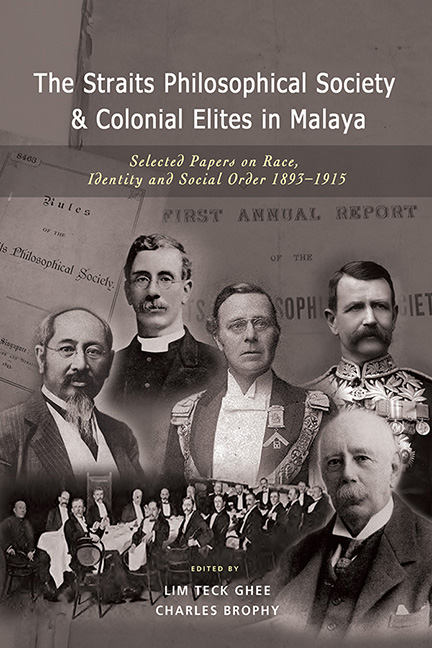 The Straits Philosophical Society and Colonial Elites in Malaya
The Straits Philosophical Society and Colonial Elites in Malaya 7 - Utilitarianism
Published online by Cambridge University Press: 09 January 2024
Summary
Editors’ Note
More direct philosophical reflection was evident in Ridley’s 1908 paper on Utilitarianism, which reflects earlier concerns expressed in the Society about liberal reform and theories of equality. Utilitarianism had been central to earlier liberal theories of empire and whilst it had long fallen out of fashion, it was through a discussion of its main tenets that Ridley sought to criticize contemporary liberalism.
In the paper Ridley rejects the idea that the doctrine of the greatest good for the greatest number necessitated the rule of the majority or the rule of the mob. He depicted the mob not as a font of wisdom but as one easily swayed by “catch-cries of loud-voiced orators”. Nor was happiness so easy to measure as, according to him, the Malay peasantry of his day was contented in the same way that the English peasantry had been generations before. Moral good, he argued, could then coincide with hierarchy, tradition and order—all of these issues echoed Brooke’s earlier essay on education. It was the “Suffragettes, Socialists, Home-rulers, and other such mono-maniacs” that sought to induce unhappiness in the masses who were the chief problem for Ridley. Whilst the increase in the general happiness of mankind remained important, he argued for gradual reform and improvement rather than radical political upheaval. Venning Thomas, in his response, sought to defend Utilitarianism from some of Ridley’s attacks, but he too expressed a similar opinion by attacking “government by public opinion” and socialist politics which, according to him, required a dose of paternalism. “Our action in taking away the ‘Keris’ of the Malay was not a mere matter of expediency, but one thoroughly in accord with the principle of utility; how much more necessary is it to remove the vote, that weapon of proved danger with which we have armed the mob!”
In dealing with a concrete subject like that of Utilitarianism, it is advisable (as indeed has been the usual custom lately in papers read before this Society) to commence by laying down a definition of the word; and this is the more necessary in the present case, as the subject of the creed or theory is not clearly indicated by the name.
- Type
- Chapter
- Information
- The Straits Philosophical Society and Colonial Elites in MalayaSelected Papers on Race, Identity and Social Order 1893-1915, pp. 103 - 115Publisher: ISEAS–Yusof Ishak InstitutePrint publication year: 2023


